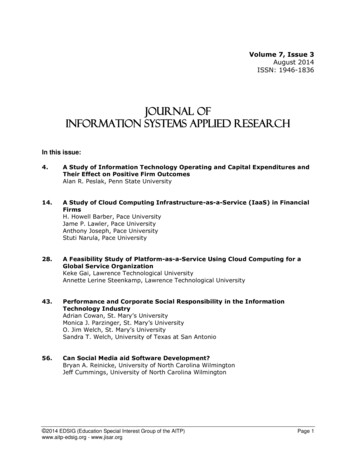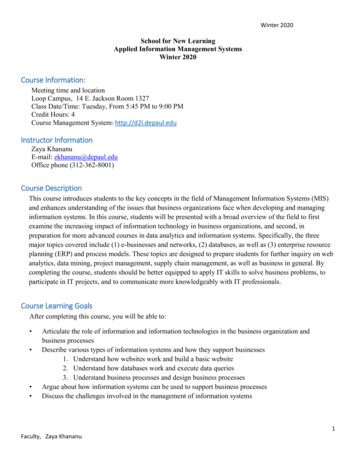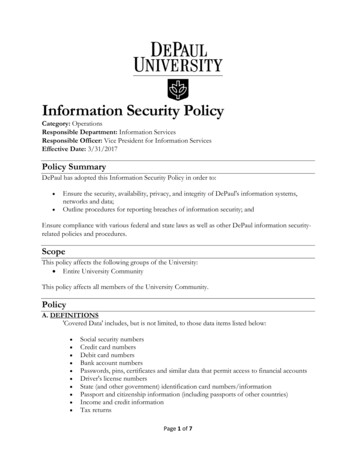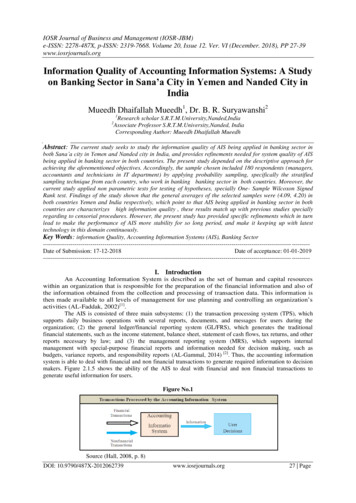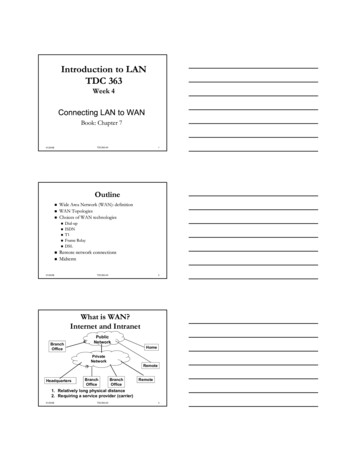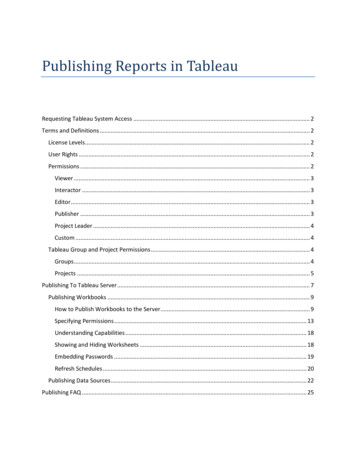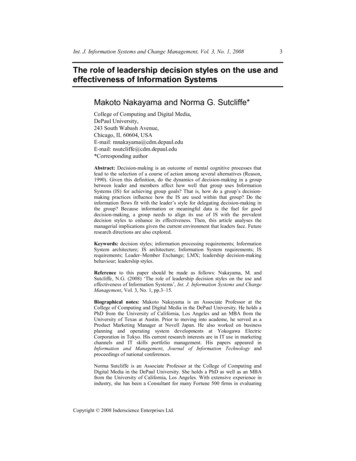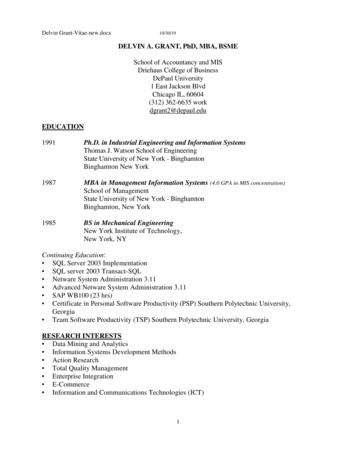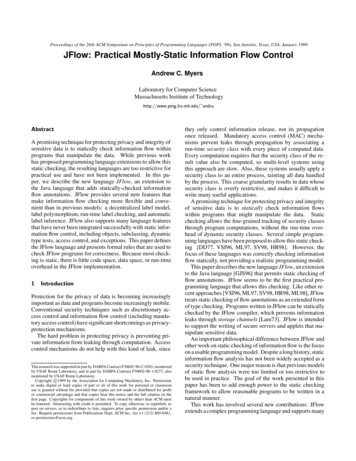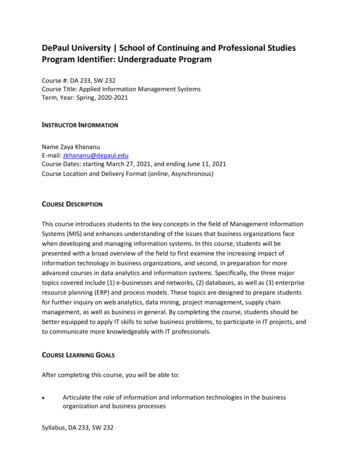
Transcription
DePaul University School of Continuing and Professional StudiesProgram Identifier: Undergraduate ProgramCourse #: DA 233, SW 232Course Title: Applied Information Management SystemsTerm, Year: Spring, 2020-2021INSTRUCTOR INFORMATIONName Zaya KhananuE-mail: zkhananu@depaul.eduCourse Dates: starting March 27, 2021, and ending June 11, 2021Course Location and Delivery Format (online, Asynchronous)COURSE DESCRIPTIONThis course introduces students to the key concepts in the field of Management InformationSystems (MIS) and enhances understanding of the issues that business organizations facewhen developing and managing information systems. In this course, students will bepresented with a broad overview of the field to first examine the increasing impact ofinformation technology in business organizations, and second, in preparation for moreadvanced courses in data analytics and information systems. Specifically, the three majortopics covered include (1) e-businesses and networks, (2) databases, as well as (3) enterpriseresource planning (ERP) and process models. These topics are designed to prepare studentsfor further inquiry on web analytics, data mining, project management, supply chainmanagement, as well as business in general. By completing the course, students should bebetter equipped to apply IT skills to solve business problems, to participate in IT projects, andto communicate more knowledgeably with IT professionals.COURSE LEARNING GOALSAfter completing this course, you will be able to: Articulate the role of information and information technologies in the businessorganization and business processesSyllabus, DA 233, SW 232
Describe various types of information systems and how they support businesses Understand how websites work and build a basic website Understand how databases work and execute data queries Understand business processes and design business processes Explain about how information systems can be used to support business processes Discuss the challenges involved in the management of information systemsCOURSE COMPETENCIESPlease note the competencies apply only to select students not to all. In this course, you willdevelop the following competencies:CompetenceCompetence Statement and CriteriaS1XCan implement technology solutions to business problems.S3XCan analyze the integration of information technologies in business processes.FXCan apply the concepts and tools discussed to one's focus areaCOURSE RESOURCESTo buy your books, go to homeSyllabus, DA 233, SW 232
REQUIRED READINGS AND RECOMMENDATIONSR Kelly Rainer Jr., Brad Prince (2015). Introduction to Information Systems (7th edition). Wiley.ISBN: 978-1119362968Recommended Strategies to do well in this course Strongly Recommended: Basic Training in MS Excel and MS Access Databasehttp://www.internet4classrooms.com/on-line 95-497c-4366-8327-ae79d2abdc9cStrongly recommended: Lynda.com for Microsoft Office tutorialsLynda.com is free to DePaul students and offers a wide range of Excel tutorials. Read all materials from the chapter. View the chapter PowerPoint presentation. Participate in each module discussion on time with reply to at least one post. Take the Module quiz for the chapter(s) assigned for the first time, and if you aresatisfied with your score, then you are done with the chapter. If not, continue withchapter reading and retake the quiz. Go to the Grade Book and check your assignments and quizzes scores and feedback.COURSE STRUCTUREThis course consists of five modules. The estimated time to complete each module is twoweeks.The following table outlines the course:Week, Module # and TitleWeek 1, Module 1:IntroductionReadingsPower point presentation (as a supplement forthe Chapter)Textbook (Rainer, Chapter 1)Power point presentation (as a supplement forthe Chapter)Week 2, Module 2A: Networks Textbook (Rainer, Chapter 6)Articles (where applicable)Week 3, Module 2B: WebsitesSyllabus, DA 233, SW 232Create Website using Google SitesGoogle Sites instructions manualPower Point presentationAssignmentsRecap 1Discussion 1Recap 2Discussion 2Zoom Meeting6-7 PMAssignment I
Week 4, Module 2C: eBusinessWeek 5, Module 3A:DatabasesWeek 6, Module 3B: EntityRelationship DiagramsWeek 7, Module 3C:Relational DatabasesWeek 8, Module 4A: ERP andProcess ModellingWeek 9, Module 4B:FlowchartsWeek 10, Module 4C:Business AnalyticsPower point presentation (as a supplement forthe Chapter)Textbook (Rainer, Chapter 7)Articles (where applicable)Power point presentation (as a supplement forthe Chapter)Textbook (Rainer, Chapter 5)Articles (where applicable)ERD WalkthroughPower point presentation (as a supplement forthe Chapter)Textbook (Rainer, Chapter 5)Articles (where applicable)Access Demo WalkthroughArticles (where applicable)Power point presentation (as a supplement forthe Chapter)Textbook (Rainer, Chapter 2 and Chapter 10Articles (where applicable)Flowchart WalkthroughArticles (where applicable)Descriptive Analytics- ExcelArticles (where applicable)Recap 3Discussion 3Zoom Meeting6-7 PMRecap 4Discussion 4Assignment IIZoom Meeting6-7 PMRecap 5Discussion 5Zoom Meeting6-7 PMAssignment IIIAssignment IVZoom Meeting6-7 PMTo see the course due dates, please check the Calendar on the course home page.GRADING SCALEA 95 to 100A- 91 to 94B 88 to 90B 85 to 87B- 81 to 84C 77 to 80C 73 to 76C- 69 to 72D 65 to 68D 61 to 64F 60 or belowSyllabus, DA 233, SW 232
PASS/FAIL GRADE POLICYStudents interested in taking a course on a Pass/Fail grade basis need to contact their academicadvisor to request the option by the end of the second week of the course. SCPS students canemail their requests to their advisors and include the course number, quarter, and student IDnumber. Non-SCPS students need to contact their home college for instructions on submittingthese requests. Please review the P/F guidelines, course restrictions and GPA implications in theUniversity catalog before making your request. A grade of Pass represents a D or betterstandard and therefore will not meet requirements that have a minimum standard of C- orbetter. For further clarification of the P/F option for SCPS students beyond the universityguidelines, please refer to the SCPS catalog.MINIMUM SCPS GRADE POLICYSCPS degree programs with majors (BAPSBA, BAPSC, BAHA, BADA, BANM, and BALS) require agrade of C- or better in courses taken at DePaul or transfer work applied to courserequirements in the Major and in the LL 261: Essay Writing course in the College Core. All othercourse requirements in these programs can be completed with a grade of D or better. SCPSdegree completion major programs (BAABS and BALS) require a C- or better in all courses takenat DePaul applied to those programs. SCPS competence-based programs (BAIFA, BAC, BAGBand BAECE) require a D or better in courses taken at DePaul or transfer work applied tocompetence requirements.INCOMPLETE (IN) GRADEThis process follows university policy.A student who encounters an unusual or unforeseeable circumstance that prevents her/himfrom completing the course requirements by the end of the term may request a time extensionto complete the work. The student must formally initiate the request by submitting the Contract for Issuanceof Incomplete Grade form (via email, word doc), no later than week 10 (or prior to thefinal week of a shorter-term course). The instructor has discretion to approve or not approve the student’s request for an INgrade. The instructor has discretion to set the deadline for completion of the work, which maybe earlier but no later than two quarters (not counting Summer term). Syllabus, DA 233, SW 232
The instructor may not enter an IN grade on behalf of a student without a completedand agreed upon contract.The student is alerted that IN grades are not considered by Financial Aid as evidence ofsatisfactory academic progress. ASSESSMENT CRITERIA FOR THE S1X, S3X, AND FX COMPETENCESCriteria for Assessment: Understands how a website can be a useful tool to solve a business problem and topromote an e-business or an idea in the competitive economy today.Implements an Entity Relationship Diagram (ERD) to depict the data model of thefunctional area in an organization.Understands topics in descriptive and predictive data by using Excel application.Uses of an Enterprise Resource Planning (ERP) system to explain the types of supportinformation systems can provide for each functional area of the organization.Understands Access database application and how organizations use to help solvemultiple problems involved in managing data. You will be assessed on the following five required components: Discussion Board ParticipationWebsite DesignMS Visio applicationAccess Database ProjectExcel ProjectModule (Recaps) QuizzesPERCENTAGE DISTRIBUTION OF ASSESSMENTSGrading Category:% of Final Grade:Assignments (x3)60%Descriptive Analytic15%Discussion (x5)10%Recaps (Quizzes) (x5)15%TotalSyllabus, DA 233, SW 232100%
GRADING POLICIES AND PRACTICESTo complete the course, you must complete each of the assignments as described in thecourse and submit them to your instructor by the assigned deadline. In addition, you mustparticipate in the course discussion forum by responding to all instructor requests and byinteracting with fellow classmates as necessary.Completed work must be uploaded on D2L. This includes all assignments and Excel dataanalysis. The discussions and recaps are completed on D2L. The due dates for each of theassignment are on the course calendar. All late submissions without an approved extensionwill receive a 5% penalty for each day late. All coursework, with or without an approvedextension, must be turned in by the end of the 11th week. After which, no submissions willbe accepted.GENERAL ASSESSMENT CRITERIA FOR ALL WRITING ASSIGNMENTSAll writing assignments are expected to conform to basic college-level standards ofmechanics and presentation.Consider visiting the Writing Center to discuss your assignments for this course or any others.You may schedule appointments (30 or 50 minutes) on an as–needed or weekly basis,scheduling up to 3 hours worth of appointments per week. Online services includeFeedback–by–Email and IM conferencing (with or without a webcam). All writing centerservices are free.Writing Center tutors are specially selected and trained graduate and undergraduatestudents who can help you at almost any stage of your writing. They will not do your work foryou, but they can help you focus and develop your ideas, review your drafts, and polish yourwriting. They can answer questions about grammar, mechanics, different kinds of writingstyles, and documentation formats. They also can answer questions and provide feedbackonline, through IM/webcam chats and email.Obviously, the tutors won’t necessarily be familiar with every class or subject, but they areable to provide valuable help from the perspective of an interested and careful reader as wellas a serious and experienced student-writer.Syllabus, DA 233, SW 232
Schedule your appointments with enough time to think about and use the feedback you’llreceive. To schedule a Face-to-Face, Written Feedback by Email, or Online Appointment, visitwww.depaul.edu/writing.DISCUSSION FORUMSDiscussion Forums are an important component of your online experience. This coursecontains discussion forums related to the topics you are studying each week. Forrequirements on your participation in the Discussion Forums, please see “CourseExpectations” in the syllabus.A Course Q & A discussion forum has also been established to manage necessary, ongoingsocial and administrative activities. This is where the management and administrative tasksof the course are conducted, and where you can ask ‘process’ questions and receive answersthroughout the course. Please feel free to answer any question if you feel you know theanswer; this sharing of information is valuable to other students.TIME MANAGEMENT AND ATTENDANCESCPS's online courses are not self-paced and require a regular time commitment EACH weekthroughout the quarter.You are required to log in to your course at least four times a week so that you canparticipate in the ongoing course discussions.Online courses are no less time consuming than "face to face" courses. You will have todedicate some time every day or at least every second day to your studies. A typical fourcredit hour "face to face" course at SCPS involves three hours of classroom meeting perweek, plus at least three to six hours of study and homework per week.This course will require at least the same time commitment, but your learning activities willbe spread out through the week. If you have any problems with your technology, or if youneed to improve your reading or writing skills, it may take even longer.Syllabus, DA 233, SW 232
The instructor should be notified if your life events do not allow you to participate in thecourse and the online discussions for more than one week. This is particularly importantwhen there are group discussions or you are working as part of a team.If you find yourself getting behind, please contact the instructor immediately.YOUR INSTRUCTOR'S ROLEYour instructor's role in this course is that of a discussion facilitator and learning advisor. It isnot their responsibility to make sure you log in regularly and submit your assignments. Asinstructor, s/he will read all postings to the general discussion forums on a daily basis butmay not choose to respond to each posting. You will receive feedback to assignments.The instructor may choose to designate "office hours" when s/he will be online and availableand will immediately respond to questions. Depending on the instructor, this response maybe by e-mail, instant messenger or telephone. Otherwise, you will generally receive aresponse to emailed or posted queries within 48 hours.YOUR ROLE AS A STUDENTAs an online student, you will be taking a proactive approach to your learning. As the courseinstructor's role is that of a learning guide, your role is that of the leader in your ownlearning.You will be managing your own time so that you can complete the readings, activities andassignments for the course, and you will also be expected to take a more active role in peerlearning.Please also note that this is a course offered by DePaul University's School of Continuing andProfessional Studies (SCPS), a college for undergraduate and graduate degree-seekingstudents 24 years and older. SCPS welcomes the perspectives and encourages theparticipation of all DePaul students, and students who take this course should respect and bemindful of SCPS's mission in supporting a diverse and inclusive environment. Moreinformation about SCPS can be found here.Syllabus, DA 233, SW 232
If you're new to SCPS see additional resources on the course home page under StudentResources/Getting Started.COURSE NETIQUETTEOnline discussions are an important part of your course experience. To ensure a positivelearning environment, please follow the following minimum expectations. Use your commonsense, as not all situations can be covered: Be polite Respect other participants’ views or opinions Think before you write, and ask yourself if you would say the same thing in person Use positive phrases (i.e., "Good idea!" or "Thanks for the suggestions," etc.) Be sensitive to cultural differences Avoid hostile, curt or sarcastic comments No objectionable, sexist, or racist language will be tolerated Create a positive online community by offering assistance and support to otherparticipants. Use correct grammar and syntaxCOLLEGE AND UNIVERSITY POLICIESThis course includes and adheres to the college and university policies described in the linksbelow:Academic Integrity Policy (UGRAD)Incomplete PolicyCourse Withdrawal Timelines and Grade/Fee ConsequencesAccommodations Based on the Impact of a DisabilityProtection of Human Research ParticipantsADDITIONAL COURSE RESOURCESSyllabus, DA 233, SW 232
University Center for Writing-based LearningSCPS Writing GuideDean of Students OfficeINSTRUCTOR BRIEF BIOZaya Khananu holds a master degree in TelecommunicationSystems from DePaul University, and a Certificate in Local AreaNetworking (LAN) from De Paul University. Mr. Khananu has beena member of the visiting faculty at the School for New Learningsince September 2005, -z/Pages/zaya-khananu.aspx where he teachesonline and on campus Quantitative Reasoning, Introduction toStatistics, Computer Productivity, and most recently designed and taught a new course titledData Driven Decisions. Mr. Khananu also serves as Professional Advisor in Computing andInformation Technology. Mr. Khananu is a member of adjunct faculty at the Liberal Art &Sciences since 2009, where he teaches pre-calculus and business calculus. In addition to hiswork at DePaul University, Mr. Khananu is a member of the adjunct faculty in the TrumanCollege Business and Computer Science department since 2007, where he teaches Introductionto Information Technology and Advanced Internet. Mr. Khananu is pursuing his second MS inPredictive Analytics from DePaul University College of Computing and Digital Media.CHANGES TO SYLLABUSThis syllabus is subject to change as necessary. If a change occurs, it will be clearlycommunicated to students.Syllabus, DA 233, SW 232
DePaul University School of Continuing and Professional Studies Program Identifier: Undergraduate Program Course #: DA 233, SW 232 Course Title: Applied Information Management Systems Term, Year: Spring, 2020-2021 INSTRUCTOR INFORMATION Name
